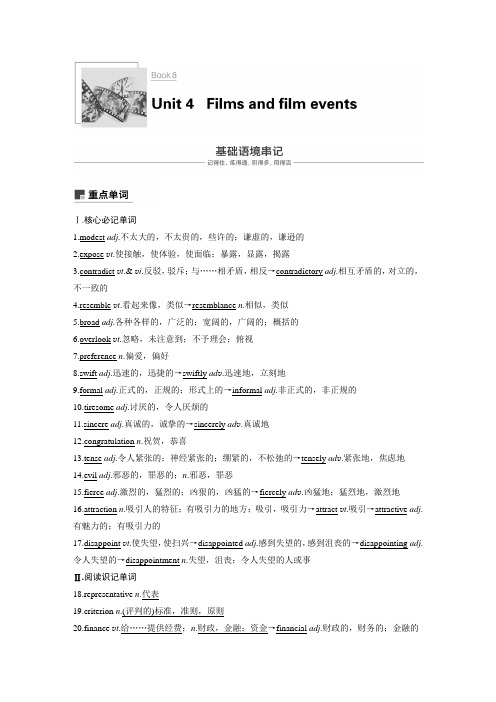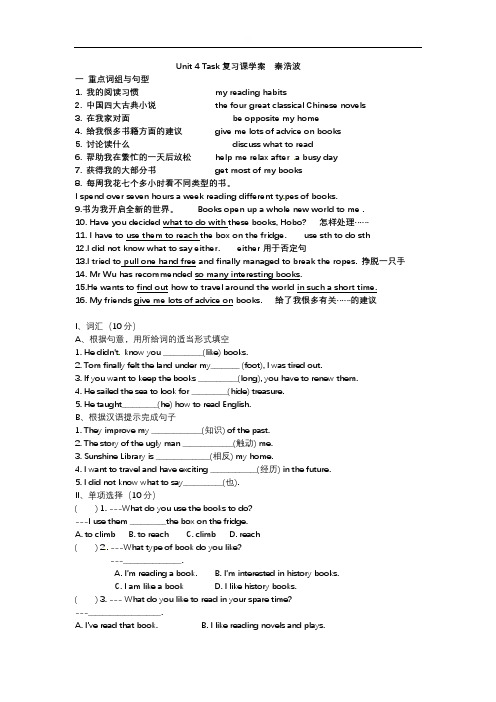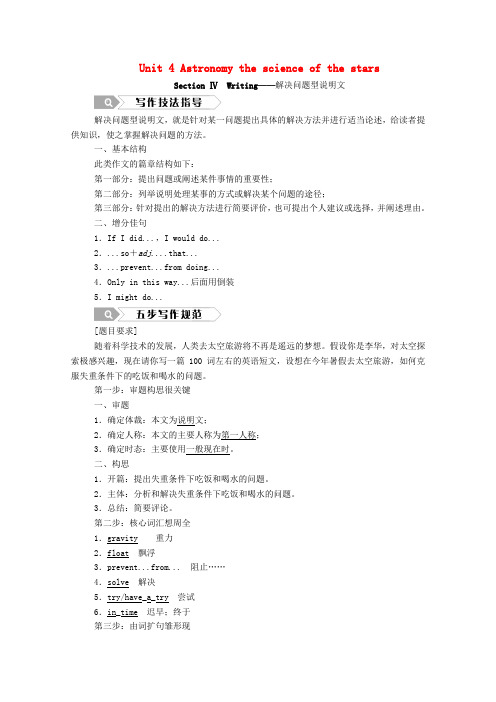unit4下学案[1]
- 格式:doc
- 大小:127.34 KB
- 文档页数:7


Ⅰ.核心必记单词1.modest adj.不太大的,不太贵的,些许的;谦虚的,谦逊的2.expose v t.使接触,使体验,使面临;暴露,显露,揭露3.contradict v t.& v i.反驳,驳斥;与……相矛盾,相反→contradictory adj.相互矛盾的,对立的,不一致的4.resemble v t.看起来像,类似→resemblance n.相似,类似5.broad adj.各种各样的,广泛的;宽阔的,广阔的;概括的6.overlook v t.忽略,未注意到;不予理会;俯视7.preference n.偏爱,偏好8.swift adj.迅速的,迅捷的→swiftly ad v.迅速地,立刻地9.formal adj.正式的,正规的;形式上的→informal adj.非正式的,非正规的10.tiresome adj.讨厌的,令人厌烦的11.sincere adj.真诚的,诚挚的→sincerely ad v.真诚地12.congratulation n.祝贺,恭喜13.tense adj.令人紧张的;神经紧张的;绷紧的,不松弛的→tensely ad v.紧张地,焦虑地14.evil adj.邪恶的,罪恶的;n.邪恶,罪恶15.fierce adj.激烈的,猛烈的;凶狠的,凶猛的→fiercely ad v.凶猛地;猛烈地,激烈地16.attraction n.吸引人的特征;有吸引力的地方;吸引,吸引力→attract v t.吸引→attractive adj.有魅力的;有吸引力的17.disappoint v t.使失望,使扫兴→disappointed adj.感到失望的,感到沮丧的→disappointing adj.令人失望的→disappointment n.失望,沮丧;令人失望的人或事Ⅱ.阅读识记单词18.representative n.代表19.criterion n.(评判的)标准,准则,原则20.finance v t.给……提供经费;n.财政,金融;资金→financial adj.财政的,财务的;金融的21.restriction n.限制,约束22.deliberately ad v.故意地23.boycott v t.拒绝购买(或使用、参加),抵制24.hatch v t.& v i.策划,(尤指)密谋;孵化,孵出25.sponsor n.赞助者,赞助商;v t.赞助,资助;主办,举办26.entry n.参赛作品;进入,加入;条目,词条27.shoot v t.& v i.拍摄;射击;打猎;射门,投篮;n.拍摄,摄影;幼苗,嫩芽28.robbery n.抢劫→rob v t.抢劫,掠夺,盗取→robber n.抢劫者,强盗29.biography n.传记,传记作品30.accumulate v t.&v i.积累,积聚;逐渐增加→accumulation n.积累,积聚31.thriller n.惊险电影(或小说)32.conquer v t.征服;占领;战胜,克服33.fantasy n.幻想,想象34.institution n.机构;制度35.parallel adj.平行的;相似的;n.相似的人或事物;相似特征语境活用[用所给词的正确形式填空]1.A Toronto man is offering a free round-the-world air ticket to the right woman.But restrictions(restrict) apply.2.I sincerely(sincere) invite you to come here again.3.This attractive(attract) tour takes you to some of San Francisco’s most cheerful holiday scenes.4.Some skin cancers are preventable by limiting unprotected exposure(expose) to the sun.5.Confidence and fear are contradictory(contradict) states of mind that both come from our belief and attitude.6.A financial(finance) crisis,just as we have seen,could not be solved by America or Europe alone.7.I’ve lost the key of my house,so I’ll have to force an entry(enter).8.The speech was quite disappointing(disappoint);it left out some main questions.9.Many elderly people expressed a strong preference(prefer) to live in their own homes.10.All evening her husband was against everything she said,and then they quarreled with each other fiercely(fierce).1.-tive后缀名词(1)detective 侦探(2)alternative可供选择的事物(3)representative代表2.“adj.+n.”构成的合成形容词(1)full-length全身的(2)full-time专职的,全日制的(3)second-hand二手的(4)first-class优秀的,一流的(5)mid-term期中的3.-ory后缀形容词(1)contradictory相互矛盾的,对立的,不一致的(2)compulsory强制的;义务的(3)satisfactory令人满意的(4)auditory听觉的(5)introductory介绍的,导言的1.in defence of为……辩护;防卫,保卫2.point out指出3.make restrictions on对……作出限制4.expose sb.to sth.使某人接触/体验某事5.have access to有……的权利/机会;得以接近/进入……6.be responsible for对……负责7.show off炫耀,卖弄8.give thought to认真考虑,思考语境活用[用上述黑体短语的正确形式填空]1.Ten years ago,I never,for one minute gave thought to what I would do to earn my living.2.At the exhibition yesterday,the TV maker showed off one of its low energy TV screens.3.The more one is exposed to the English-speaking environment,the better he or she will learn the language.4.The leader’s speech in defence of the policy was not very convincing.5.Our government has promised to improve our water quality,so it won’t be long before the residents can have access to clean water.6.People spend a lot of time pointing out bad manners but it would be even more helpful if we'd publicly acknowledge good manners when we see them.1.盘点含of的介词短语(1)regardless of 不管(2)as a result of由于(3)in spite of尽管(4)on account of由于,因为(5)on behalf of代表(6)instead of代替,而不是(7)in defence of防卫,保卫2.v.+off短语集锦(1)show off炫耀(2)turn/switch off关闭(电源、开关等)(3)give off发出(蒸汽、光、热等)(4)keep off让开,不让接近(5)pay off付清(某人的)工资(6)put off推迟(7)see sb.off 为……送行(8)take off脱下;起飞;快速成功1.as long as...只要We make no restrictions on the kinds of films we show—as long as a film’s quality meets our standards,we include it.我们对我们所放映的电影的种类不作限制——只要影片的质量符合我们的标准,就接纳它。

Unit 4 Task复习课学案秦浩波一重点词组与句型1. 我的阅读习惯my reading habits2. 中国四大古典小说the four great classical Chinese novels3. 在我家对面be opposite my home4. 给我很多书籍方面的建议give me lots of advice on books5. 讨论读什么discuss what to read6. 帮助我在繁忙的一天后放松help me relax after a busy day7. 获得我的大部分书get most of my books8. 每周我花七个多小时看不同类型的书。
I spend over seven hours a week reading different ty pes of books.9.书为我开启全新的世界。
Books open up a whole new world to me .10. Have you decided what to do with these books, Hobo? 怎样处理……11. I have to use them to reach the box on the fridge. use sth to do sth12.I did not know what to say either. either用于否定句13.I tried to pull one hand free and finally managed to break the ropes. 挣脱一只手14. Mr Wu has recommended so many interesting books.15.He wants to find out how to travel around the world in such a short time.16. My friends give me lots of advice on books. 给了我很多有关……的建议I、词汇(10分)A、根据句意,用所给词的适当形式填空1. He didn’t know you ___________(like) books.2. Tom finally felt the land under my________ (foot), I was tired out.3. If you want to keep the books ___________(long), you have to renew them.4. He sailed the sea to look for __________(hide) treasure.5. He taught__________(he) how to read English.B、根据汉语提示完成句子1. They improve my ______________(知识) of the past.2. The story of the ugly man ______________(触动) me.3. Sunshine Library is _______________(相反) my home.4. I want to travel and have exciting _____________(经历) in the future.5. I did not know what to say___________(也).II、单项选择(10分)( ) 1. ---What do you use the books to do?---I use them __________the box on the fridge.A. to climbB. to reachC. climbD. reach( ) 2. ---What type of book do you like?---________________.A. I’m reading a book.B. I’m interested in history books.C. I am like a bookD. I like history books.( ) 3. --- What do you like to read in your spare time?---____________________.A. I’ve read that book.B. I like reading novels and plays.C. I did not know what to read.D. I did not know how to get away.( ) 4. Don’t shout __________ them. They are reading a book.A. inB. atC. withD. about( ) 5. He saw a huge army of tiny people _________towards him.A. comeB. to comeC. comesD. coming( ) 6. ---By the way, can you tell me ___________our book report?---Before next Friday.A. how to ask forB. what to write aboutC. when to hand inD. who to find( ) 7. .Could you give me some _______ on how to learn English _______?- Sure. Practice makes perfect.A. advice; goodB. suggestions; goodC. advice; wellD. suggestion; well ( ) 8. --- ___________can I keep them on time?---For two weeks.A. How longB. How oftenC. How farD. How much( ) 9. After reading the book, I am not ____________ I used to be.A. shyB. as shyC. very shyD. as shy as( ) 10. ---Why do you usually read?--- ______________.A. I get most of booksB. Because someone has recommended a book.C. I love reading.D. We often meet together.III、完形填空Jennie sat at her window as usual, looking out upon the street, with a look of sadness on her face, “What a long day this is going to be!”Then she saw a little boy running down the street, swinging his schoolbag. Looking up to the window, he took off ____1____ hat and bowed with a bright, pleasant smile.“What a nice ____2____,” said Jennie to herself, as the boy ran out of sight. “It seems like having the sunshine. I wish everybody who goes by would look up ____3____ smile. George, the lit tle boy, told his mother about that ____4____ girl when he got back home, “She looks so helpless. I wish I could do so mething for her.”“Why not give her some ____5____?” said his mother. George agreed.The next morning, as Jennie ____6___ at the window again, she saw George with a handful of beautiful flowers carefully picking his way across the street. He stopped in front of her window, smiling pleasantly, and said, “Can I come in?” Jennie told him _____7____ to get into the house.Opening the d oor to Jennie’s gentle “Come in”, George said, “I’ve brought you some flowers.”“Are they for me?” said Jennie ____8____. “How kind you are,” she continued, as George put the flowers on her lap. I’ve ____9___ received any flower since we moved to the town.”“Did you live in t he countryside?” asked George, ___10____ the old, small and empty room.“Yes,” said Jennie.Jennie used to have a happy family and live in a beautiful house in the countryside. However,。

Unit 4 Astronomy the science of the starsSection ⅣWriting——解决问题型说明文解决问题型说明文,就是针对某一问题提出具体的解决方法并进行适当论述,给读者提供知识,使之掌握解决问题的方法。
一、基本结构此类作文的篇章结构如下:第一部分:提出问题或阐述某件事情的重要性;第二部分:列举说明处理某事的方式或解决某个问题的途径;第三部分:针对提出的解决方法进行简要评价,也可提出个人建议或选择,并阐述理由。
二、增分佳句1.If I did...,I would do...2....so+adj....that...3....prevent...from doing...4.Only in this way...后面用倒装5.I might do...[题目要求]随着科学技术的发展,人类去太空旅游将不再是遥远的梦想。
假设你是李华,对太空探索极感兴趣,现在请你写一篇100词左右的英语短文,设想在今年暑假去太空旅游,如何克服失重条件下的吃饭和喝水的问题。
第一步:审题构思很关键一、审题1.确定体裁:本文为说明文;2.确定人称:本文的主要人称为第一人称;3.确定时态:主要使用一般现在时。
二、构思1.开篇:提出失重条件下吃饭和喝水的问题。
2.主体:分析和解决失重条件下吃饭和喝水的问题。
3.总结:简要评论。
第二步:核心词汇想周全1.gravity 重力2.float 飘浮3.prevent...from... 阻止……4.solve 解决5.try/have_a_try 尝试6.in_time 迟早;终于第三步:由词扩句雏形现1.如果我去太空旅游,会有一个问题。
If I went to travel in space, there_would_be_a_problem.2.我可能要面对一个问题。
I might be_faced_with a problem.3.在外太空,重力很弱。

Ⅰ.认阅读单词1.tornado n.(pl.-oes or -os)龙卷风;旋风2.drought n.旱灾;久旱3.landslide n.(landfall)(山地或悬崖的)崩塌;滑坡4.tsunami n.海啸5.volcanic eruption火山喷发6.magnitude n.(地)震级;重大7.evacuate v t.疏散;撤出v i.撤离8.helicopter n.直升机9.crack n.裂纹;裂缝v i.& v t.(使)破裂10.brick n.砖;砖块11.metal n.金属12.revive v t.& v i.复活;(使)苏醒13.revival n.振兴;复苏14.unify v i.& v t.统一;(使)成一体15.volcano n.(pl.-oes or -os)火山16.erupt v i.& v t.(火山)爆发;(岩浆、烟等)喷出17.typhoon n.台风18.hurricane n.(尤指西大西洋的)飓风19.whistle v i.吹口哨;发出笛声v t.吹口哨n.哨子(声);呼啸声20.kit n.成套工具;成套设备21.first aid kit急救箱Ⅱ.记重点单词1.disaster n.灾难;灾害2.slide v i.& v t.(slid,slid)(使)滑行;滑动3.flood n.洪水;大量v i.淹没;大量涌入v t.使灌满水;淹没4.rescue n.& v t.营救;救援5.damage v t.损害;破坏n.损坏;损失6.destroy v t.摧毁;毁灭7.shelter n.避难处;居所;庇护v t.保护;掩蔽v i.躲避(风雨或危险)8.ruin n.& v t.破坏;毁坏9.percent n.百分之……adj.& ad v.每一百中10.trap v t.使落入险境;使陷入圈套n.险境;陷阱11.bury v t.埋葬;安葬12.effort n.努力;艰难的尝试;尽力13.context n.上下文;语境;背景14.supply n.供应(量);补给;[pl.]补给品v t.供应;供给15.tap v i.& v t.轻叩;轻敲;轻拍n.水龙头;轻叩;轻敲16.pipe n.管子;管道17.calm adj.镇静的;沉着的v t.使平静;使镇静18.aid n.援助;帮助;救援物资v i.& v t.(formal)帮助;援助19.crash v t.& v i.碰撞;撞击n.撞车;碰撞20.sweep v t.& v i.(swept,swept)打扫;清扫21.wave n.海浪;波浪v i.& v t.挥手;招手22.strike v i.& v t.(struck,struck/stricken)侵袭;突击;击打n.罢工;罢课;袭击Ⅲ.知拓展单词1.death n.死;死亡→dead adj.死的→deadly adj.致命的→die v.死亡2.affect v t.影响;(疾病)侵袭;深深打动→effect n.效果;结果;影响→effective adj.有效的3.shock n.震惊;令人震惊的事;休克v t.(使)震惊→shocking adj.令人震惊的→shocked adj.感到震惊的4.electricity n.电;电能→electric adj.电的;用电的→electronic adj.电子的5.breathe v i.& v t.呼吸→breath n.呼吸→breathless adj.气喘吁吁的6.wisdom n.智慧;才智→wise adj.明智的→unwise adj.不明智的7.suffer v t.遭受;蒙受v i.(因疾病、痛苦、悲伤等)受苦→suffering n.受难;苦楚→sufferer n.受苦者;受难者8.survive v i.生存;存活v t.幸存;艰难度过→survival n.幸存;生还→survivor n.幸存者;生还者9.power n.电力供应;能量;力量;控制力→powerful adj.强大的;强壮的→powerless adj.无力的10.emergency n.突发事件;紧急情况→emergent adj.紧急的→emerge v i.浮现;出现11.deliver v t.& v i.递送;传达v t.发表→delivery n.投递;送交12.summary n.总结;概括;概要→summariz(s)e v t.& v i.总结;概括13.length n.长;长度→long adj.长的→lengthen v.(使)变长1.ambulance n.救护车2.ancient adj.古代的3.anniversary n.周年纪念日4.annual adj.每年的5.antique n.古董,古玩6.apartment n.公寓7.apparent adj.表面上的;明显的Ⅳ.背核心短语1.as if似乎;好像;仿佛2.in ruins严重受损;破败不堪3.in shock震惊;吃惊4.in the open air露天;在户外5.on hand现有(尤指帮助)6.sweep away消灭;彻底消除7.refuse to do sth 拒绝做某事8.the number of...……的数量9.as usual像往常一样10.come to an end告终;结束Ⅴ.悟经典句式1.Chickens and even pigs were too nervous to eat,and dogs refused to go inside buildings.(too...to...)鸡甚至猪都太紧张而不能吃东西,狗也不愿意进屋里去。

UNIT 4 BODY LANGUAGE美文诵读——开启快乐学习之旅美文欣赏Many years ago, when I was fresh out of school and working in Denver, I was driving to my parents' home in Missouri for Christmas.I stopped at a gas station about 50 miles from Oklahoma City, where I was planning to stop and visit a friend.While I was standing in line at the cash register, I said hello to an older couple who were also paying for gas.I took off, but had gone only a few miles when black smoke poured from the back of my car.I stopped and wondered what I should do.A car pulled up behind me.It was the couple I had spoken to at the gas station.They said they would take me to my friend's.We chatted on the way to the city, and when I got out of the car, the husband gave me his business card.I wrote him and his wife a thankyou note for helping me.Soon afterward, I received a Christmas present from them.Their note that came with it said that helping me had made their holidays meaningful.Years later, I drove to a meeting in a nearby town in the morning.In late afternoon I returned to my car and found that I'd left the lights on all day, and the battery was dead.Then I noticed that the Friendly Ford dealership — a shop selling cars — was right next door.I walked over and found two salesmen in the showroom.写作借鉴1.拟人修辞法:The battery was dead.电池无电。
Unit 4 Exploring literature话题阅读背景导入:汤显祖是明代成就最高、影响最大的剧作家,其“临川四梦”达到了同时代戏剧创作的高峰。
一些中外学者曾将汤显祖与莎士比亚进行平行研究,认为这两位戏剧大师在16世纪与17世纪之交的东西方剧坛上为人类作出了卓越的贡献。
文章主要介绍了“中国的莎士比亚”——汤显祖的文学成就及其作品风格。
In his 402nd anniversary year, Shakespeare is still rightly celebrated as a great wordsmith and playwright. But he was not the only great master of dramatic writing to die in 1616, and he is certainly not the only writer to have left a lasting influence on theatre.While less known worldwide, Tang Xianzu is considered China's greatest playwright and is highly spoken of in that country of ancient literary and dramatic traditions.Tang was born in 1550 in Linchuan, Jiangxi Province, and pursued a low-key career as an official until, in 1598, he retired to focus on writing. Unlike Shakespeare's large body of plays, poems and sonnets (十四行诗), Tang wrote only four major plays: The Purple Hairpin (《紫钗记》), The Peony Pavilion (《牡丹亭》), A Dream Under the Southern Bough(《南柯记》), and The Handan Dream(《邯郸记》). The Peony Pavilion is considered as Tang's masterpiece. The rest three are constructed around a dream narrative, a device through which Tang unlocked the emotional dimension of human desires and ambitions and explored human nature beyond the social and political restrictions of that time.Tang lived in the end of the Ming Dynasty and the popularity of his works had a good reason. Similar to Shakespeare, his success rode the wave of a renaissance in theatre as an artistic practice. As in Shakespeare's England, Tang's works became hugely popular in China too. During Tang's China, the way, in which playlets were enjoyed and performed, changed. Kunqu Opera, a form of musical drama, spread from southern China to the whole nation and became a symbol of Chinese culture. Combining northern tune and southern music, Kunqu Opera was known for its poetic language, music, dance movements and gestures. Tang's works benefited greatly from the popularity of Kunqu Opera, and his playlets are considered as classics of Kunqu Opera.While Tang and Shakespeare lived in a world away from each other, there are many things they share in common, such as the humanity of their drama, their iconic and heroic figures, their love for poetic language, a lasting popularity and the anniversary during which we still celebrate them.【译文】在莎士比亚逝世402周年时,他仍当之无愧地被称颂为伟大的语言大师和剧作家。
Unit 4 Why don’t you talk to your parents?第一课时(Section A 1a-1c)【学习目标】1. 学习谈论生活中遇到的问题,会使用could或should来表达建议。
2. 通过谈论生活中遇到的问题及听取别人的建议,合理宣泄不良情绪,学会与他人友好相处。
【学习重点】★重点单词:allow(允许;准许),wrong(有毛病的;错误的).★重点短语:allow sb. to do sth.(允许某人做某事),hang out (闲逛),get into a fight(吵架;打架).★重点句型:—What’s wrong?(怎么了?)—I’m really tired because I studied until midnight last night.(我真的很累,因为我昨天晚上学到半夜。
)—Why don’t you go to sleep earlier this evening?(你为什么今天晚上不早点睡觉呢?)【课前预习方案】(一)小小翻译官。
(请预习课文,将下列中文译成英文)。
1. 不得不做某事have to do sth.2. 得到足够的睡眠get enough sleep3. 太多作业too much homework4. 空闲时间free time5. 允许某人做某事allow sb. to do sth.6. 闲逛hang out7. 课后补习班after-school classes 8. 吵架;打架get into a fight9. 学到半夜study until midnight 10. 早点睡go to sleep earlier(二)请朗读1a中学生遇到的各种烦恼,对你来说这些问题中哪些是严重的,哪些是不严重的?根据你的看法将它们的序号写在方框里。
(三)想一想。
你能想出几种提建议的方法?请把他们写在下列横线上。
1.You could...2.You should...3.What about...?4.How about...?5.Why don’t you...?【课堂活动方案】活动一:学习1a的各种烦恼。
Unit 4 Stage and screenUnderstanding ideas【学习目标】1. 掌握本课的重要词汇与句式;2. 通过阅读课文,学习并掌握与话题相关的语言;3. 引导学生基于课文内容联系生活实际,发表自己的意见和观点。
【学习重难点】1. 本课重要词汇与句式的灵活运用;2. 能够基于课文内容联系生活实际,发表自己的意见和观点。
【学习过程】Step 1 Warming upQuestions:1. What do you know about Hamlet?2. Can you say something about Peking Opera?3. What do you think the differences between these two performances?Step 2 Before readingActivity 1Look at the pictures of two performances and talk about their differences and similarities.Consider the following:a. orchestrab. costumes and masksc. stage setd. performers' movementsStep 3 While reading1. Activity 2Read the passage and find out what aspects of Peking Opera most impressed theauthor.Question: What aspects of Peking Opera most impressed the author?Answer:2. Pay attention to the language points during reading.(1)Dating back to the 18th century, Peking Opera has over two hundred years of history. 重点讲解date back to的用法。
2020年⼈教版英语九年级unit4全单元学案(⽆答案)2020学年⼈教版英语九年级Unit 4 I used to be afraid of the dark.第⼀课时(Section A 1a-1c)⼀、学习⽬标1 熟练运⽤used to do sth谈论⾃⼰、他⼈过去的习惯、爱好、形象及经常做的事情。
2 能够听懂有关学习⽅法的简短对话。
3能运⽤used to 来谈论过去。
⼆、学习重难点1熟记重点单词短语。
2 正确使⽤used to三、学习步骤⼀、导⼊used to的⽤法“used to+动词原形”表⽰过去常常⼲某事,现在不在⼲了。
只有⼀种形式,即过去式。
例如:I used to go to work by bus. Now I take a taxi.So the sentence “I used to be afraid of the dark.” means in Chinese:我过去常害怕⿊暗。
“used to”的疑问形式和否定形式:—Did you use to be afraid of the dark?—Yes, I used to be afraid of the dark.—Did he use to be afraid of the dark?—No, he did not use to be afraid of the dark._There used to be a church here ,didn ‘t there ?跟踪练习(1) He______ ______ ____ after school. 放学后他过去常常踢⾜球。
(2) He ____ ______ _____ __________________. 他过去不吸烟。
(3)He used to play football. (改为⼀般疑问句,再回答)_______________________________________________________⼆、⾃学朗读、翻译短语I haven’t seen you for four years! a couple of days.Now I’m tall. And so are you! you used to wear glasses.you’ve changed! You used to have short hair.you used to be really tall! Not anymore.it used to be red, didn’t it? it used to be curly.You used to be short, didn’t you? 复习反意疑问句,完成练习:(1)Lily will go to China, ______ _____?(2)She doesn’t come from China, ________ ________?(3) You haven’t finished homework, _________ __ ?(4) He knows little English, _________ ______?三、交流注意谈论外貌和性格的不同句型What’s he\ she like ?What does he\ she look like?完成1a两⼈⼀组谈论⾃⼰过去的外表、性格等及与现在的不同。
吕艺中学 七年级英语下册学案 Unit 4 A1 1 1
班级 姓名 组号 学案编号 1 Unit 4 Don’t eat in class. Section A1(1a-2d) 学习目标:词汇 rule, arrive, (be) on time, hallway, hall, dining hall 等. 句型:1.Don’t eat in class. / We can eat in the dining hall, but we can’t eat in class. 能力目标:让学生能够使用否定祈使句陈述规章要求。(使用have to和 must)
学习重点:词汇和主要句型 学习难点:灵活使用情态动词can, must and have to.并完成适当练习。 学 习 流 程 课前预习案:(1a-2c) 单词:1.规章,制度____________ 2.到达_________3.走廊,过道__________ 4.大厅,礼堂___________5.听,倾听_________ 6.打架;战斗_______ 7.抱歉的;难过的;惋惜的_____________ 8.在外面;外面的_____________ 9.穿;戴__________ 10.重要的__________ 短语 1、上课迟到_____________2、按时;准时 3、在走廊上 4、在教室里 5、在餐厅 6、听音乐 7.在课上 _________ 8. 在音乐教室_____________9.在外面吃···__________ 10.戴帽子____________11.我的第一天_____________12.带音乐播放器_________ 13.穿校服_________________ 课堂导学案:请同学们讨论一下在教室里或学校里我们哪些能做和哪些不能做呢? 请用以下句型来列举讨论一下学校制度一:例如: 1. We can study in the classroom. We can’t speak in class. 2. We must study hard. 3. Don’t listen to music in class. 我的观点:1. _______________________________ 2.________________________________________ 3.________________________________________ (教师和多个学生进行交流谈论,设置情景,渐入课本内容) 导入课题:Can we eat in class? No , we can’t. Which rules can’t we break (违反)? (完成1a,1b) (1) Practice the dialogue.
1. A: What are the rules? B: Well, we can’t arrive late for… 2. A: Can we listen to music in class? B: We can’t… , but we can listen to it at home. 完成listening 2a and 2b 当堂达标巩固案: (1)根据汉语提示完成句子。 1. Don’t stay ___________ (外面)。 2. Do you have many __________(制度)? 3. It’s__________________(重要) to be quiet in class . 4. Boys and girls! Don’t arrive __________(迟到)for the meeting. (2)单选 ( )1._______your homework. You have to see a doctor now. A. Do B. Don’t C. Don’t do D. Can’t do ( )2.We _______Shenzhen at 7:00 last Sunday. A. got B. went C. arrived D. arrived in ( )3.They have to ________sneakers(运动鞋) for gym classes(体育课). A. dress B. wear C. get dressed D. are in ( )4.He’s never ________ class. A. arrive B. late for C. arrive late D. late ( )5.----Can you wear hats at school? --- _______ A. Yes, we can’t B. No, we can’t C. No, we don’t D. Yes, we are 阶段性达标检测案 (根据汉语提示完成句子) 1.不要在课堂上睡觉。_______ ________ in class.
2. 我们经常在餐厅吃饭。We often eat in the ________ ________. 3. 在上学的第一天你必须带书。 You ________ _______ ________ your books on your _________ day at school. 4. 咱们听音乐吧。Let’s _________ ________ ___________. 5.他喜欢穿校服 He likes to ________ ________ ________. 吕艺中学 七年级英语下册学案 Unit 4 A2
2 2
班级 姓名 组号 学案编号 2 Unit 4 Don’t eat in class. Section A2 (2d-3c) 学习目标:词汇 bring; uniform; quiet, 句型:1.Don’t … 2.We can… 3.We can’t… 4.We must/ have to… 情感目标:运用have to 和must表达自己的想法。(I must study hard.) 能力目标:表达自己主观意愿和客观情况 学习重点:Grammar Focus中的句型 学习难点:情态动词have to/must的用法。 学 习 流 程 课前预习案:(2d-3c) 单词:(请在后面写出词性) 1.带来;取来__________( )2.校服;制服_________( )
3.安静的___________( )4图书馆__________( )5.打架___________( ) 短语 1.一些制度_______________ 2.其中的一些制度 3、一个不错的学校 4、上课迟到 5、必须按时 6.带…到…__________ 7.不得不穿…__________ 8.安静___________ 9.在图书馆 _____________ 10.在学校___________11.拍照__________ 12.听…____________13.来学校____________14在我梦想的学校里_____________ 课堂导学案: (根据上一节课所学内容)请大家列出我们在教室里该做的和不该做的。 1.Don’t_______________________ 2.We can’t ________________________ 3.We can________________________ 4. __________________________________ 5._____________________________ 6.________________________ Make a dialogue:(小组计分,四人一组) A: Can we talk in class? B: We can’t talk in class, but we can… C: Can we …? D: ……
(2)Give the students enough time to do grammar focus. (给学生一定的时间完成语法句型翻译) (3)Discussion(讨论) 完成3b 当堂达标巩固案: 句型转换1.Please clean the classroom.(改为否定句) _________ __________the classroom please. 2.She has to go to bed by ten o’clock.(改为一般疑问句,并否定回答) ___________ she _________ to go to bed by ten o’clock. ________, she ___________. 3. I can play soccer on Sunday.( 改为一般疑问句) __________ __________ play soccer on Sunday. 4.Tom has to go to school at seven.(对划线部分提问) ________ does Tom have to _________ at seven. 5. We have to clean the classroom quickly. (对划线部分提问) ______ ________ you ______ _________ __________ quickly? 阶段性达标检测案 I.用have to或must填空。 1. Do you ________ wash your clothes on Sunday? 2. He ________ stay at home and look after his brother today. 3. You __________ finish your homework this afternoon. 4. They don’t ___________ go there today. 5. __________she practice her guitar every day? II.1.学好英语很重要。It is ____________________learn English well.
2. 我们不必天天来上学。We ______ _______ ______come to school every day. 3.不准在走廊上奔跑。___________ run in the ____________.